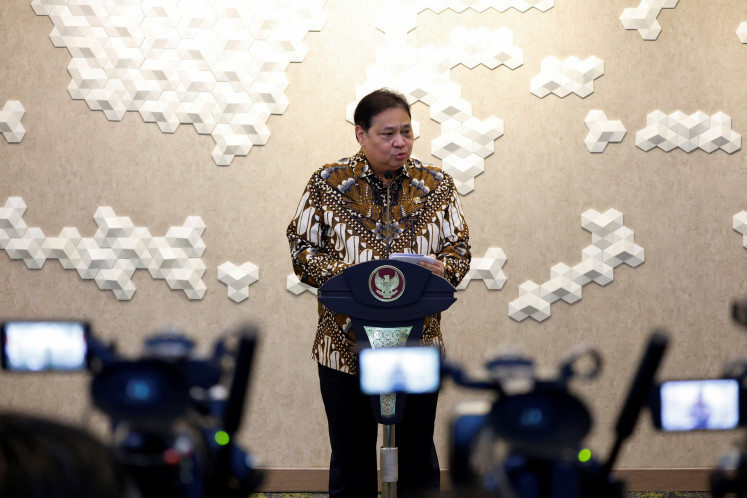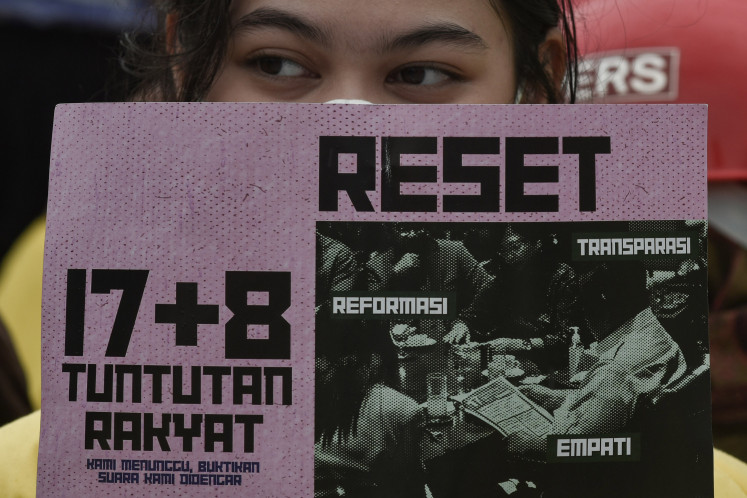Popular Reads
Top Results
Can't find what you're looking for?
View all search resultsPopular Reads
Top Results
Can't find what you're looking for?
View all search resultsCigarette ads aired during family viewing hours: Activists
Anti-tobacco activists have accused three private broadcasters of airing cigarette ads during family viewing hours in another example of just how aggressive tobacco companies can be in advertizing their products.
Change text size
Gift Premium Articles
to Anyone
Anti-tobacco activists have accused three private broadcasters of airing cigarette ads during family viewing hours in another example of just how aggressive tobacco companies can be in advertizing their products.
The Lentera Anak Foundation and the Pembaharu Muda Community filed a report alleging cigarette ad violations to the Indonesian Broadcasting Commission (KPI) on Monday.
They reported 22 violations in which cigarette ads were allegedly aired outside the mandated time window of 9:30 p.m. to 5 a.m. as stipulated in the broadcasting program standards (SPS).
The report was based on a survey conducted from March 1 to March 3. Many of the ads were packaged in film and music festival promotions, the activists said.
Three TV stations were mentioned in the report: NetTV, TRANSTV and SCTV.
Most of the alleged violations were committed by NetTV, with 18 violations during the three-day study. TRANSTV and SCTV both committed two violations during the same period.
Net Mediatama Televisi (Net TV) spokesman Aditya Wardani was not available for comment on Monday.
A representative of Pembaharu Muda, Citra Demi, said the ads did not warn viewers of the dangers of smoking.
Based on Government Regulation No. 109/2012, cigarette ads have to put warnings into every ad broadcast on television.
KPI commissioner Dewi Setyorini said her team had collected data on the ads reported and would investigate whether there were any violations.
“The cigarette elements in the ads are shrouded in promotions. We have handled similar cases in which cigarette ads are hidden inside promotions for cultural programs. We will first investigate before deciding our next move,” Dewi said.
Data from the AdsTensity research center shows that cigarette companies spent Rp 6.3 trillion (US$ 470.8 million) on ads in 2016, an increase of 45 percent from the previous year.
Companies now spend more on television ads because the government has banned cigarette ads on billboards in Jakarta and at sporting events across Indonesia.
Currently, House of Representatives Commission I plans to ban all cigarette ads on television in an ongoing revision to the Broadcasting Law.
The report on cigarette ad violations comes as the government mulls whether or not it will continue discussions on the controversial tobacco bill. The government is expected to announce its decision next week.
During a separate discussion regarding the government’s decision on the tobacco bill, Hasbullah Thabrany, professor of public health at the University of Indonesia, said health problems caused by smoking would inflict economic losses.
“The Health Ministry has calculated that, over the past 10 years, the losses inflicted by tobacco and cigarette production have exceeded the state income from cigarette taxes,” Hasbullah said.
Economist Faisal Basri added that the Healthcare and Social Security Agency (BPJS) had experienced deficits of 30 percent and these were largely generated by treatments for diseases caused by smoking.
“The cigarette industry has been categorized as a ‘sunset industry’ in which its production keeps decreasing. What the government should do now is prepare workers in the cigarette industry and tobacco farmers for work in other sectors,” Faisal said.
Experts generally agree that the tobacco bill only benefits the tobacco industry and is not going to improve welfare of the tobacco farmers because 60 percent of the tobacco used in the Indonesian cigarette industry is imported. (rdi)










